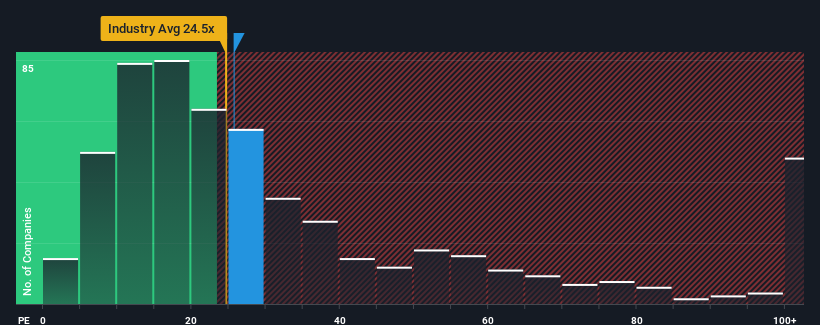- Saudi Arabia
- /
- Electrical
- /
- SASE:1303
Electrical Industries Company's (TADAWUL:1303) Shares Climb 25% But Its Business Is Yet to Catch Up
Electrical Industries Company (TADAWUL:1303) shares have continued their recent momentum with a 25% gain in the last month alone. The annual gain comes to 278% following the latest surge, making investors sit up and take notice.
Even after such a large jump in price, it's still not a stretch to say that Electrical Industries' price-to-earnings (or "P/E") ratio of 25.7x right now seems quite "middle-of-the-road" compared to the market in Saudi Arabia, where the median P/E ratio is around 26x. However, investors might be overlooking a clear opportunity or potential setback if there is no rational basis for the P/E.
Electrical Industries certainly has been doing a great job lately as it's been growing earnings at a really rapid pace. It might be that many expect the strong earnings performance to wane, which has kept the P/E from rising. If you like the company, you'd be hoping this isn't the case so that you could potentially pick up some stock while it's not quite in favour.
See our latest analysis for Electrical Industries

What Are Growth Metrics Telling Us About The P/E?
There's an inherent assumption that a company should be matching the market for P/E ratios like Electrical Industries' to be considered reasonable.
Taking a look back first, we see that the company grew earnings per share by an impressive 132% last year. However, the latest three year period hasn't been as great in aggregate as it didn't manage to provide any growth at all. Accordingly, shareholders probably wouldn't have been overly satisfied with the unstable medium-term growth rates.
Comparing that to the market, which is predicted to deliver 17% growth in the next 12 months, the company's momentum is weaker based on recent medium-term annualised earnings results.
In light of this, it's curious that Electrical Industries' P/E sits in line with the majority of other companies. It seems most investors are ignoring the fairly limited recent growth rates and are willing to pay up for exposure to the stock. Maintaining these prices will be difficult to achieve as a continuation of recent earnings trends is likely to weigh down the shares eventually.
The Bottom Line On Electrical Industries' P/E
Its shares have lifted substantially and now Electrical Industries' P/E is also back up to the market median. Typically, we'd caution against reading too much into price-to-earnings ratios when settling on investment decisions, though it can reveal plenty about what other market participants think about the company.
We've established that Electrical Industries currently trades on a higher than expected P/E since its recent three-year growth is lower than the wider market forecast. Right now we are uncomfortable with the P/E as this earnings performance isn't likely to support a more positive sentiment for long. Unless the recent medium-term conditions improve, it's challenging to accept these prices as being reasonable.
And what about other risks? Every company has them, and we've spotted 2 warning signs for Electrical Industries you should know about.
If you're unsure about the strength of Electrical Industries' business, why not explore our interactive list of stocks with solid business fundamentals for some other companies you may have missed.
Valuation is complex, but we're here to simplify it.
Discover if Electrical Industries might be undervalued or overvalued with our detailed analysis, featuring fair value estimates, potential risks, dividends, insider trades, and its financial condition.
Access Free AnalysisHave feedback on this article? Concerned about the content? Get in touch with us directly. Alternatively, email editorial-team (at) simplywallst.com.
This article by Simply Wall St is general in nature. We provide commentary based on historical data and analyst forecasts only using an unbiased methodology and our articles are not intended to be financial advice. It does not constitute a recommendation to buy or sell any stock, and does not take account of your objectives, or your financial situation. We aim to bring you long-term focused analysis driven by fundamental data. Note that our analysis may not factor in the latest price-sensitive company announcements or qualitative material. Simply Wall St has no position in any stocks mentioned.
About SASE:1303
Electrical Industries
Engages in the manufacture, assembly, supply, repair, and maintenance of transformers, compact substations and low voltage distribution panels, electrical distribution boards, cable trays, switch gears, and other electrical equipment.
Outstanding track record with flawless balance sheet and pays a dividend.
Market Insights
Community Narratives





